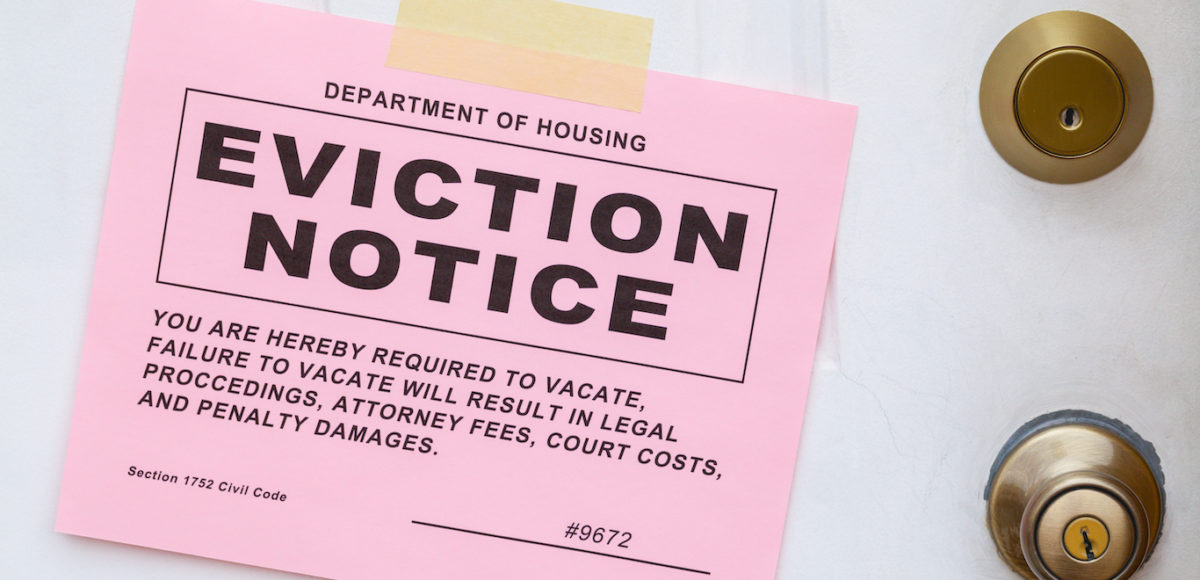You try to keep your lifestyle renter-friendly, but sometimes things happen in your apartment. Maybe you decided to alter your space, and then realized you may not have been allowed to. Maybe you’re not facing eviction, but you’re worried you might be soon. Maybe you just received an eviction notice, and need more information to handle the situation. What reasons does a landlord need to kick you out of an apartment? Whatever your situation is, read on to find out.
Can a Landlord Kick You Out for That?
Failure to Pay Rent
If you’ve signed a lease, that document likely states pretty clearly the amount of rent you owe and when you owe it. If you don’t pay your rent within the specified period, this is considered a violation of your lease terms, which is a legally binding document. This can be grounds for eviction. Depending on state or local laws, there may be a “grace period” that lets you submit rent a few days late before you’re at risk for eviction.
You may also be able to pay partial rent now (only temporarily—you’ll need to pay the rest at a later time) if you find yourself in a bind. It’s best to check local laws in your area to see what is or isn’t permitted regarding payment grace periods or partial payments. Even if you have a tenancy at will agreement with no written lease, your landlord can terminate your tenancy if you don’t pay rent, which requires you to move out after a specified notice period.
Keeping Pets
Maybe you think your landlord won’t know about your super quiet indoor car, or the month when you kept your friend’s dog while they were traveling. Maybe you’re right, and they’ll never find out. But if they do, and your lease has a clear “no pets” policy, you could be in trouble. If you’ve adopted a new pet without telling your landlord, most landlords will send you a notice that you need to make other arrangements for your pet, or pay a fine or pet fee before they evict you. However, this is not typically required of a landlord, and having an unauthorized pet when your lease clearly states “no pets” can be grounds for eviction.
Noise Complaints
You may think your sound system’s beefed-up subwoofer is harmless fun, but could it get you evicted? Maybe. Some lease agreements will include specific terms about noise complaints. For example, a lease may state that a noise violation where law enforcement is called to the scene is grounds for eviction. Other leases may have broader guidelines (and local regulations may protect you in some cases, too), so it’s wise to thoroughly read your lease and see what qualifies as grounds for eviction in your specific case.
Failure to Disclose Roommates
When you sign a lease, you are agreeing to be responsible for the property while you live there. If there are other adults over the age of 18 living with you, their names should also be on the lease. Failing to notify your landlord of a change in roommates or an additional person moving in can be grounds for eviction in some states.
Does the same apply to minors? Do I have to tell a landlord about my child? The Fair Housing Act states that a landlord cannot ask you about your familial status during the application process (this is to prevent discrimination), but it’s a good idea to have your children listed as occupants on your lease. In case of emergency, your landlord should know who all needs to be accounted for within your household, and that includes children.
Destruction of Property
While nuances may differ in local laws, destruction of property is almost always grounds for eviction. Intentionally breaking windows, damaging walls, or otherwise causing intentional harm to a landlord’s property are considered destruction of property (amongst other things), and can be grounds for eviction.
“So, can I be evicted for painting my apartment?” This can be a gray area, and will often depend on what your landlord considers “destruction of property” vs. “unauthorized changes to the property.” Some landlords don’t mind simple changes like paint, but others require approval for any changes to the property, including paint or even nail holes in the walls. While painting alone may not get you an eviction, you may forfeit your security deposit.
Smoking
Can a landlord kick you out of an apartment for smoking? It depends. If your lease states that smoking is not allowed, then yes, you can be evicted for violating your lease terms. Leases can differ widely on this, but landlords can legally ban smoking— whether that’s cigarettes, vapes, or other forms of smoking.
Is My Tenancy at Risk? What to Know About Lease Violations and Evictions
Maybe your landlord is threatening eviction, or maybe you’ve already received an eviction notice. What now? Check out these common questions and answers about eviction to help you navigate the situation, and be sure to check your local regulations for further guidance and specific details.
How many lease violations before eviction is possible?
Unless you live in a state or locale that regulates this, even one lease violation can technically get you evicted, especially if your lease specifically mentions eviction as a consequence of breach of contract. Many landlords don’t want to go through the expensive eviction process unless they absolutely have to, so they’ll likely give you a warning. Some leases also specify that certain
How long do you have to move out after eviction?
In the U.S., every state has specific regulations for how long you have to move out after receiving an eviction notice. This can be anywhere from 3 to 30 days, so check your state’s laws ASAP if you’re facing eviction. If you have a tenancy-at-will agreement (with no written lease or specified lease term), consult your lease to determine the amount of notice your landlord has to give you.
It’s important to note: termination of a tenancy at will does not put an eviction on your record. But, it can be just as stressful as an eviction, particularly if your landlord is difficult to work with. Both leases and tenancy at will agreements have varying laws at the local level, so check your state and city’s regulations to be sure you know your rights.
Getting Kicked Out Of Your Apartment? Move Out and Move On to Something Better
Navigating a stressful conflict with a landlord can be tough. If you feel things can’t be worked out, leave your old apartment behind and move into a new space. Use ApartmentSearch’s advanced filters to help you find a new apartment with the space and amenities you’re looking for while staying in budget.




